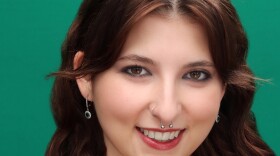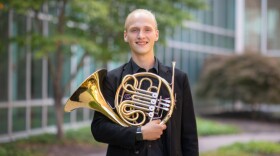Gifford: This is Robert Gifford, your host for Strike Up the Band. It's a pleasure and honor for this week's show to have Josh LaMar with us. He's the Director of Bands for the Cape Public Schools. Welcome, Josh.
LaMar: Thank you, sir. Thanks for having me.
Gifford: Well, it's great to have you here. And I think it would help the listeners if you could tell us a little bit about your band program in the Cape schools.
LaMar: Sure. So at Cape Public Schools, we start our beginners in seventh grade. We actually have two parts of our instrumental program. We have an orchestra that has been around since about 1912. And then we have a band program that's been around — that was started by that orchestra director — Frieda Rieck, probably around 1923-1924. So next year, we should be coming up on our 100th anniversary Gifford: Oh, boy. LaMar: So but yeah, we have a junior high program, that's seventh and eighth and then we have a high school program that's nine through twelve.
And with our program in Cape Public Schools, I'm very fortunate to get to work with two other gentlemen, Mr. Billy Keys and Michael Harrer, and they both split up the program. Billy works real hard with our brass students and Michael Harrer works with our woodwind students and I get to work with our percussion so I think that's one of the biggest factors of our success is being able to break the instruments down by section and get to do some real detail work with the students especially at the beginning level.
Gifford: Well, so 100 years you don't look that old. Maybe you were in the band and I think Frieda Rieck ended up in the music department on campus at one point. LaMar: I think she did. Gifford: Yeah, so that name is familiar.
LaMar: I think that's why she left the old high school that was at Schulz. Gifford: And she left to take a position at [Southeast Missouri State] University.
Gifford: What would you say you're the most proud or what are some things you are very proud of your program and your students?
LaMar: Well, I think we have a have had a long tradition of a really strong marching band — competitive marching band, and that really came came around in the 1980s. And I would like to give Neil Casey credit for that. He really put [in] a lot of effort. So since I've been around I would like to think that I'm you know, trying to keep our programs strong for his history, and I think he's done a whole lot. I also think that we have a good jazz program, too. Bill Ewing in ,the 70s 60s and 70s contributed greatly to that. We have a lot of people in our community that was a part of of Ewing's jazz program. And, you know, I don't think we're as nearly as good as they were probably but you know, our jazz program and our marching band.
Gifford: Okay, that's, that's wonderful. What do you feel, or what do you foresee as the future? I mean, we've all been through the COVID and all kinds of things have been said about education. All kinds of things have been said about technology, replacing live music and so forth. What do you see as a future of public school bands in our country?
LaMar: Oh, well, one of the things that I've noticed since I started teaching in 1999 was the integration of music technology and there's been a lot of sound reinforcements that have come into play, not only in marching band, but on our stage concert band. One of the things that I've noticed from our concert band music to our percussion ensembles is there's play along tracks that kind of add this extra level of just it's just a new new sonority that you couldn't achieve with just wind instruments. And I'm sure some people really won't like that — you can't make everybody happy, but our our kids really like the integration of that.
Gifford: Sure, because there's what's it's what's happening, so to speak, in the real world. Do you have any upcoming concerts that you would like to mention?
LaMar: We always do a pre-contest concert at Kinder Performance Hall, the first week of March so it's gonna be the first Thursday of March. And then we do that concert to get ready for the state large ensemble contest, which is on March 14 at the River Campus.
Gifford: I want to thank you so much from all of us, so to speak, from all of your students and the parents that you've worked with over the years for what you've done for young people and in our state, in our country, our community, and your dedication and hard work. And so, I want you to feel that you're very much appreciated. Because I understand completely the long hours that you spend, but then there's such a reward in seeing the students make the progress. I want to thank Mr. Lamar for joining us this week with information about the band program in the Cape Girardeau Public Schools.







